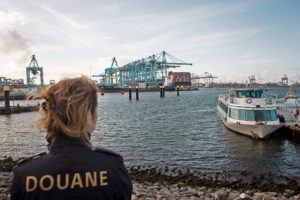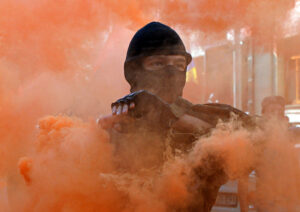“We will ensure that money is for normal people, normal families, hard-working Nederlanders,” calls out the two-metre tall, platinum blonde man. Free beer is flowing in De Blauw Trap bar in Venlo, the hometown of the old face of the Dutch far-Right, Geert Wilders. He’s back, to launch a new campaign, in front of several hundred people and almost a dozen police. “We choose for the Dutch first. I want to hear one thing from you: the Dutch first! Nederlanders eerst!”
Like everything in the life of this man — who, as a result of his criticism of Islam, has received death threats and had 24/7 security for 19 years — the words are carefully chosen. Other populist parties on the Dutch Right have risen and fallen but Wilders, remarkably, is still here, the longest-serving MP, with 25 years in parliament. He is the establishment “outsider”, dependably critical of the government, and the Netherlands’s best-known party leader. And right now, he is polling as the biggest voice on the far-Right, ahead of next month’s general election, with his anti-immigration, anti-Islam stance combined with left-wing social policies on topics such as benefits, pensions and healthcare.
Most parties have for years said that they will not work with Wilders. Objections have been made to his attitude towards the rule of law and his refusal to apologise for a 2014 speech calling for “fewer” Moroccan people — which was judged to be criminal. But now, for the first time in a long time, his Party for Freedom (PVV) has a chance at governing. The party currently leading some polls, the People’s Party for Freedom and Democracy (VVD), has a new head, Dilan Yeşilgöz-Zegerius, and she has said she will “not shut out any party” from coalition negotiations.
So, does this party of one — for Wilders is the only member — really want to be part of the Dutch government it has been attacking for years? “Yes, we do, actually — and I think our chances are improving by the day,” he tells me, leaning in and speaking softly. “Because people or parties who were excluding us are not, now — at least not all of them — and we are doing better every week in the polls.” Why is this?
“We have a very stable party, a good programme, good candidates and people are really fed up with policy about asylum seekers, immigration and terrorist threats. So, I believe if there would be any chance for us — which, of course, is not true, but still — if there would be any chance to govern, it would be now.”
Indeed, despite the recent rise of a Dutch farmers’ party, and one hat splintered from the Christian Democrats under the popular backbencher Pieter Omtzigt, Wilders has endured in Dutch politics. “Wilders has, over the years since 2006 when he started the Party for Freedom, built up a very strong brand,” says Sjoerd van Heck, a pollster at Ipsos. “He has adhered to the basic principles of how you position something in the market, communicating a consistent message and always staying true to it.” He is, for instance, consistently anti-immigration.
As an immigrant to the Netherlands, I found it somewhat uncomfortable to interview the people who came to the PVV launch. It was surprising to find that many think Wilders sometimes goes too far. “I don’t see him as prime minister, but he has a lot of good points,” says Robert, 65, from Roermond. Past proposals, such as for a headscarf tax, are not popular, even among his supporters.
Jeanet Brakel, 48, from Noord Brabant, tells me: “He says things you’re not supposed to say, and some people find him too hard-line, but he does it for us and he does it in a funny way.” I wonder if she would feel more kind-hearted towards immigrants if she felt less hard up herself? “It’s difficult,” she replies. “Everything is expensive. Holland was a rich country but now so many people are lining up [for benefits] and the foreigners come here and get everything.”
To his supporters, Wilders is a strong voice against the cosmopolitan, liberal ideology that, most feel, leaves them behind. He has what van Heck, the Ipsos pollster, describes as “an economic agenda that’s a bit Left-wing”. And some of those I met at De Blauw Trap swing between fringe parties on the far-Right and those on the far-Left. Hai van Dijk, from Venlo, says he has swung between Wilders and the Socialist Party (SP). “It’s all a protest vote, an anti-vote,” he says. “People don’t feel heard.”
He is not alone, according to Matthijs Rooduijn, associate professor of political science at Amsterdam University. “Discontent was always mobilised by parties on the fringes of the political spectrum: radical Right parties or radical Left parties like the SP,” he says. “But right now, we have two parties that are really mobilising this discontent — and really expressing worries about our politics in the Netherlands — that are not clearly from the fringes of the political spectrum.” That is, the new farmers’ party, and Omtzigt’s.
Responding to this new challenge, from these two new parties, Wilders has claimed in the Dutch press that he is “milder” than he used to be, willing to cooperate on reducing asylum rather than “banning” it, and scrapping his “Ministry for Remigration and De-Islamisation”. But Rooduijn says the content of his manifesto is much the same: “When you look at his programme and ideas, it’s not really more moderate than it was in the past. What has changed is maybe the tone of Wilders” — in a bid, apparently, to appeal to more mainstream parties as a coalition partner.
The other thing that has changed, according to Rooduijn, is “the fact that Yeşilgöz has opened the door a little bit”. But, he adds, “I still don’t think it is very likely he will be part of a government coalition”. Other parties, not least Omtzigt’s recent addition, still exclude Wilders. Omtzigt is currently leading some polls, and his manifesto launch this week addresses the core issues of this election: promoting a decent standard of living, controlling immigration, but above all restoring trust in government. Recent scandals have severely damaged faith in politicians — including one relating to earthquake damage in Groningen and another relating to tax that felled a previous government and is still unresolved.
It will be very difficult for any government to restore that trust, though. The Netherlands is one of the world’s most proportional systems, with 21 groups in parliament and 26 standing. A whole spectrum of views gets parliamentary representation, but the irony is that voters have very little influence over who actually governs: the coalition process is a “black box” of political negotiation that takes place in The Hague, not the ballot box.
Whether or not Wilders succeeds in being part of government — or supporting a minority coalition — the influence of far-Right parties like his is undeniable. “To some extent, these voters have succeeded,” says Rooduijn. In response to them, centre-right parties have shifted their policies. “They have become more restrictive on immigration, more focused on identity issues,” he says, in a bid to win back voters.
Meanwhile, Wilders sells his story of being an outsider while taking a vigorous, sometimes poisonous, sometimes funny part in the democratic system. He is an excellent debater, sharing his quick wit in the chamber through social media clips and regular newsletters. In a recent budget debate, he enticed his Forum for Democracy rival Thierry Baudet to explain why he doubts the moon landings happened, before saying, like a practised stand-up: “I think you are already quite far on your way to the moon.”
Was he inspired by Trump, with his banter and his America first mantra? “Well, it was not what I thought about: I am not Trump,” he tells me. “But it is happening in many Western countries and also in the Netherlands, that our own people have been forgotten: normal, average people, families, who are having trouble making ends meet.” Although at the campaign launch, Wilders referenced the conflict in the Middle East and terrorist acts in Europe — and has consistently been pro-Israel — his voters seem focused primarily on the Netherlands. “We are there for them.”
After an hour of pressing the flesh, he is ushered into a car which 11 police officers accompany out of the square. Back in De Blauw Trap, the crowd trickles home. And I notice a sign above the bar. “Nights you can’t remember,” it reads, “with friends you’ll never forget.”
Disclaimer
Some of the posts we share are controversial and we do not necessarily agree with them in the whole extend. Sometimes we agree with the content or part of it but we do not agree with the narration or language. Nevertheless we find them somehow interesting, valuable and/or informative or we share them, because we strongly believe in freedom of speech, free press and journalism. We strongly encourage you to have a critical approach to all the content, do your own research and analysis to build your own opinion.
We would be glad to have your feedback.
Source: UnHerd Read the original article here: https://unherd.com/



